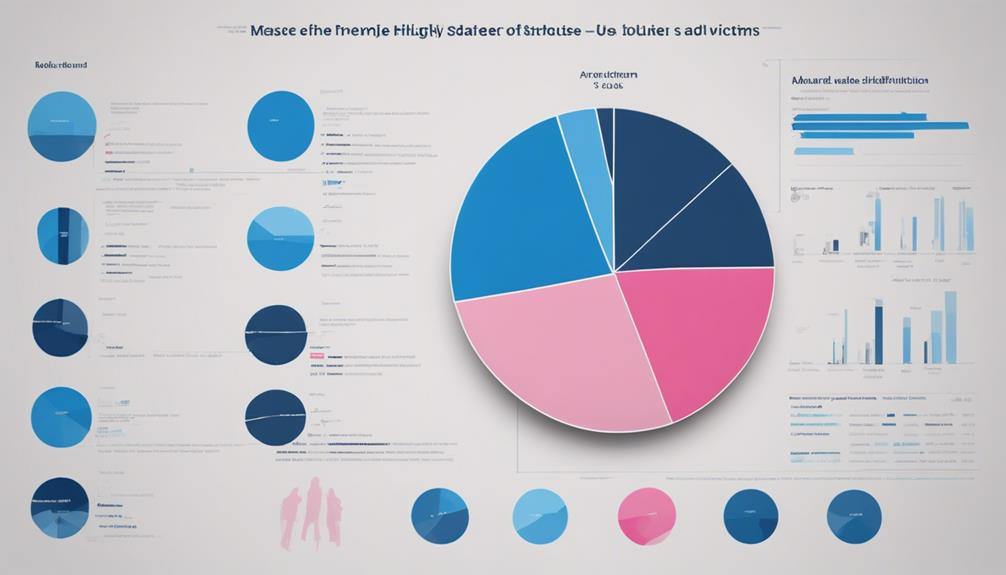Key Facts About Attempted Sexual Assault: Most cases of sexual assault go unreported, with only about 310 out of 1,000 assaults officially reported. Survivor disclosure rates are approximately 30%, influenced by fear, shame, and lack of support. Females make up the majority of victims, with American women facing a high risk. Post-assault, victims can suffer anxiety, trauma, and feelings of vulnerability. Prevention strategies like bystander intervention programs and educational campaigns aim to raise awareness and support victims. Understanding these key facts sheds light on the complexities of attempted sexual assault.
Key Takeaways
- Approximately 63% of sexual assaults are not reported to law enforcement.
- Survivor disclosure rates are around 30%.
- Females make up the majority of sexual assault victims.
- Post-assault experiences include anxiety, fear, and trauma.
- Bystander intervention programs and education help prevent sexual assault.
Prevalence of Unreported Cases
Despite the prevalence of sexual assault, a significant number of cases go unreported to law enforcement agencies. Approximately 63% of sexual assaults aren't brought to the attention of the police. This underreporting stems from various factors such as the fear of retaliation, feelings of shame, and a lack of trust in the justice system. Studies indicate that out of every 1,000 sexual assaults, only about 310 are officially reported.
Survivors often opt not to report these incidents due to concerns regarding privacy, the stigma attached to being a victim, and the possibility of being re-traumatized during legal proceedings. The decision not to report these crimes has a direct impact on the low prosecution and conviction rates seen in sexual assault cases, perpetuating a cycle where perpetrators aren't held accountable for their actions.
This lack of reporting creates a significant barrier in achieving justice for survivors and holding offenders responsible for their crimes.
Survivor Disclosure Rates

Survivor disclosure rates, indicating the percentage of individuals who share their experience, stand at around 30%.
Many survivors choose to confide in friends or family members when they do disclose. Factors like trust, support systems, and fear of judgment influence a survivor's decision to disclose their assault.
Disclosure Challenges Faced
Many survivors of sexual assault grapple with significant challenges when it comes to disclosing their experiences. Various barriers like fear, shame, and lack of support hinder their ability to come forward. Around 90% of survivors never report the abuse to law enforcement, and about 30% never disclose the abuse to anyone. Only approximately 10% choose to report the assault.
Fear, shame, stigma, and lack of support are major factors that prevent survivors from speaking out. These low disclosure rates emphasize the importance of safe and supportive environments where survivors can feel comfortable coming forward. It's essential to address these challenges and provide resources to encourage survivors to disclose their experiences and seek the help they need.
Support System Importance
Supportive and helpful networks are essential in empowering survivors of sexual assault to share their experiences and seek assistance. Shockingly, 90% of survivors never report the abuse to law enforcement, with 30% choosing to remain silent about their experiences altogether. Fear of retaliation, stigma, and lack of support often prevent survivors from disclosing their abuse.
Only a mere 10% of survivors opt to report the assault to authorities. This highlights the critical role that support systems play in encouraging survivors to come forward and seek help. By fostering a safe and understanding environment, these networks can help survivors feel empowered to share their stories and begin their journey towards healing and justice.
Impact on Recovery
Addressing the impact of low survivor disclosure rates on recovery is essential in providing necessary support and resources for individuals affected by sexual assault. With only 30% of survivors choosing to disclose their abuse and a mere 10% reporting it to law enforcement, a significant 70% suffer in silence.
Fear, shame, and lack of support play a role in these low disclosure rates. This lack of disclosure can hinder survivors from accessing vital resources and support needed for their recovery. Encouraging a safe environment for survivors to come forward, offering understanding and empathy, can potentially increase disclosure rates and improve outcomes for those affected by sexual assault.
It's imperative to break the barriers that prevent survivors from seeking the help they deserve.
Gender Distribution of Victims

Females overwhelmingly comprise the majority of victims in cases of attempted sexual assault. The gender distribution of victims reveals a stark contrast in the prevalence of assault between males and females:
- Females make up 82% of all juvenile victims of sexual assault.
- Women account for 90% of adult rape victims in the United States.
- Males ages 16-19 are four times less likely to be victims of sexual assault compared to females.
- Around 2.78 million men in the U.S. had experienced attempted or completed rape as of 1998, with approximately 10% of rape victims being male.
These statistics underscore the disproportionate impact of sexual assault on females across various age groups.
While it's important to recognize and address all instances of sexual assault regardless of the victim's gender, these figures highlight the prevalence of such crimes among females and emphasize the need for targeted support and prevention strategies tailored to this demographic.
Impact on American Women
American women frequently experience profound impacts as victims of attempted or completed rape. Statistics reveal that approximately 1 in 5 American women have faced attempted or completed rape in their lifetime, with 9 out of 10 rape victims in the U.S. being female in 2003. Among different demographic groups, American Indian/Alaskan women have the highest rate of attempted sexual assault at 34.1%.
Moreover, girls aged 16-19 are four times more likely to be victims of attempted sexual assault. Disturbingly, 93% of juvenile sexual assault victims know their attacker, highlighting the prevalence of acquaintance assault. These figures underscore the distressing reality that many American women are at risk of experiencing the physical, emotional, and psychological repercussions of sexual assault.
It's evident that the impact of attempted sexual assault on American women is significant and underscores the urgent need for preventive measures and support systems to address this pervasive issue.
Impact on American Men
With approximately 3% of American men having experienced attempted or completed rape, the impact on male survivors is a significant concern that warrants attention and support. The aftermath of sexual assault can have lasting effects on men, both physically and emotionally. Here are four key points to contemplate regarding the impact on American men:
- Stigma: Male survivors of sexual assault may face societal stigma, stereotypes, and misconceptions that can hinder their ability to seek help and support.
- Mental Health: Many male survivors experience psychological issues such as anxiety, depression, post-traumatic stress disorder (PTSD), and suicidal thoughts following the assault.
- Physical Health: The physical consequences of sexual assault on men can include injuries, sexually transmitted infections, and chronic pain.
- Barriers to Reporting: Men may encounter unique challenges when reporting sexual assault, including fear of not being believed, concerns about their masculinity, and a lack of awareness about available resources.
Types of Attempted Sexual Assault
Male survivors of sexual assault may encounter various types of attempted sexual assault, each presenting unique challenges and consequences. Attempted sexual assault can manifest in different forms, each with its own set of characteristics and potential harm. Below is a table outlining some common types of attempted sexual assault:
| Type of Attempted Sexual Assault | Description | Consequences |
|---|---|---|
| Groping | Unwanted touching of intimate body parts | Physical discomfort, emotional distress |
| Verbal Threats | Threats of sexual violence or coercion | Psychological fear, trauma |
| Unwanted Advances | Persistent unwanted sexual advances or propositions | Anxiety, feelings of violation |
| Unlawful Restraint | Physical confinement or restriction of movement | Fear, loss of control |
Understanding the different types of attempted sexual assault is important in recognizing and addressing these harmful behaviors. Victims should be supported and encouraged to report such incidents to prevent future occurrences and promote accountability for perpetrators.
Effects on Victims

Victims of attempted sexual assault often endure lasting psychological distress similar to that experienced by survivors of completed assaults. The effects on victims can be profound and long-lasting:
- Anxiety, Fear, and Trauma: Individuals may experience heightened levels of anxiety, fear, and trauma post the assault, impacting their daily lives.
- Impact on Well-being: The sense of safety and well-being can be greatly compromised, leading to difficulties in trusting others and feeling secure.
- Feelings of Shame and Guilt: Survivors may grapple with intense feelings of shame, guilt, and self-blame, affecting their self-esteem and mental health.
- Loss of Trust and Increased Vulnerability: The experience can result in a loss of trust in others and a heightened sense of vulnerability in various situations.
Seeking support and counseling is essential for those who've undergone attempted sexual assault to address the emotional aftermath and begin the process of healing and recovery.
Prevention Strategies

Individuals can take proactive steps to prevent attempted sexual assault by engaging in effective prevention strategies. Bystander intervention programs like The MVP and The Green Dot have shown to be successful in preventing these incidents. Educational programs in schools and workplaces also play an essential role in raising awareness and stopping attempted sexual assault.
Public education campaigns like Its on Us and CODIS contribute greatly to educating the public and preventing such assaults. Support programs such as The Men's and Women's Programs and Bringing in the Bystander have demonstrated efficacy in preventing attempted sexual assault as well.
Additionally, U.S. troops organize events like 5K runs for Sexual Assault Awareness Month to raise awareness and prevent these incidents. By actively participating in these prevention strategies, individuals can help create a safer environment and reduce the risk of attempted sexual assault.
Frequently Asked Questions
What Is the Definition of Attempted Sexual Assault?
Attempting sexual assault involves trying to engage in non-consensual sexual behavior but failing to complete the act. It can still deeply affect victims emotionally. Perpetrators may display predatory behaviors. Reporting such incidents is crucial for documenting, seeking help, and preventing future assaults.
What Is the Main Idea of Sexual Assault?
The main idea of sexual assault involves any non-consensual sexual contact or behavior. It encompasses acts like rape, attempted rape, unwanted touching, and verbal harassment. Survivors suffer lasting physical and emotional effects. Understanding these forms is crucial to combatting the issue effectively.
What Are the Facts About Sexual Consent?
Understanding sexual consent is vital. It involves clear, enthusiastic agreement without coercion. Consent can be withdrawn at any time. Open communication and respect for boundaries are essential. Practicing consent prevents assault and fosters healthy relationships.
What Is the Most Important Evidence in a Sexual Assault Investigation?
DNA evidence plays a critical role in sexual assault investigations by linking perpetrators to crime scenes. It aids in identifying and holding offenders accountable, revolutionizing how these cases are prosecuted and increasing the likelihood of successful outcomes.
Conclusion
To wrap up, attempted sexual assault is a pervasive issue with far-reaching consequences. The prevalence of unreported cases and low survivor disclosure rates highlight the need for increased awareness and support for victims.
The impact on both American women and men underscores the importance of prevention strategies. By understanding the key facts and types of attempted sexual assault, individuals can better protect themselves and others from this violation of personal boundaries.
Stay informed, stay vigilant.










